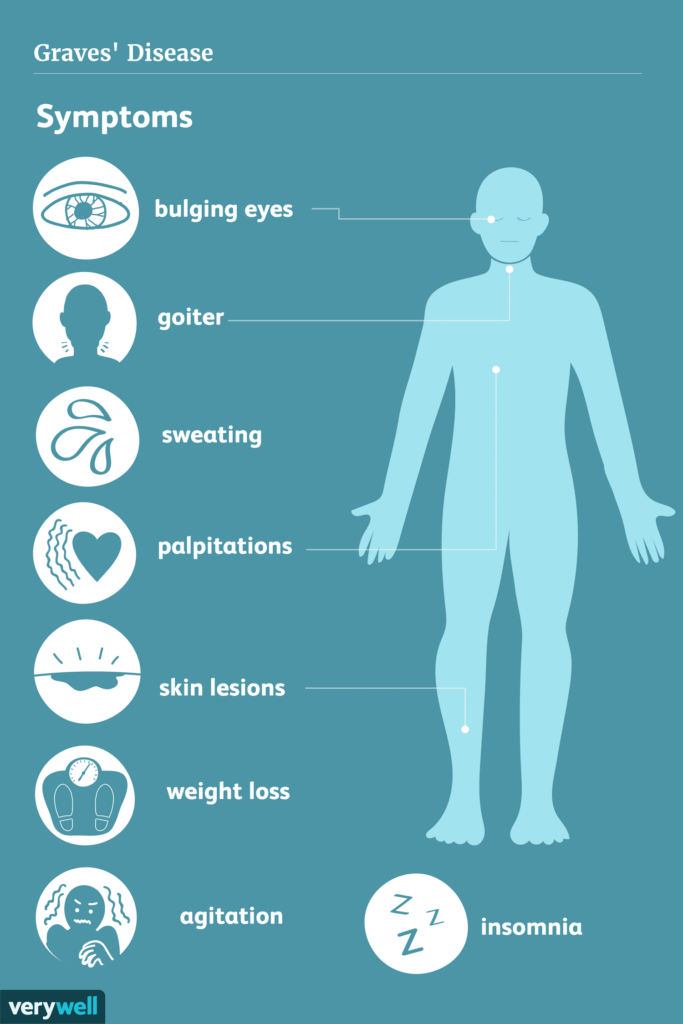Feeling restless, anxious, and exhausted, even with a good night’s sleep and a healthy diet, you may be showing symptoms of Graves’ disease. This often misunderstood condition affects your thyroid. It’s a small gland in your neck. It plays a big role in your energy and health. If untreated, Graves disease can harm your heart, eyes, and emotions. Let’s explore this condition and its effects on young people, especially young women.
Graves Disease can Make Your Thyroid on Overdrive
Think of your thyroid as a tiny butterfly-shaped gland in your neck. It controls how fast or slow your body runs. Graves disease occurs when your immune system attacks your thyroid. It’s the body’s defence system, but it got confused. This makes it go into overdrive, pumping out way too much thyroid hormone.
Why should young people care about Graves disease? It’s more common in young women. Know the signs. If you don’t treat it, it can harm your heart and eyes. It can also make you feel awful.
Could it be Graves? Look Out for These Signs
Graves disease can feel a bit like being on an emotional rollercoaster. You might:
- Feel Anxious: Worry a lot or feel on edge.
- Have Mood Swings: Your emotions change quickly.
- Lose Weight: Even if you’re eating normally, you might lose weight.
- Get the Shakes: Your hands might tremble.
- Have a Racing Heart: Your heart might beat really fast.
- Sweat a Lot: You might sweat even when it’s not hot.
- Have Trouble Sleeping: You might find it hard to fall asleep or stay asleep.
- Feel Weak: Your muscles might feel tired and weak.
- Go to the Bathroom More: You might need to pee more often.
- Have Period Problems: If you’re a girl, your period might be lighter, irregular, or missing.
What Causes Graves Disease?
Graves disease is a complex autoimmune disorder with no single, definitive cause. Your immune system protects your body. It misidentifies the thyroid gland as a threat and attacks it. This causes an overproduction of thyroid hormones. It leads to the symptoms of Graves disease.
The cause is a mystery. But, several factors likely contribute to its development. Genetics plays a role. Those with a family history of autoimmune diseases are at higher risk. Certain viruses or bacteria may trigger Graves disease in those at risk. Also, emotional and physical stress can trigger or worsen symptoms. This shows the complex link between the mind and body.
When Your Eyes Are Affected by Thyroid Eye Disease
In some cases, Graves’ disease can affect your eyes. Most of the symptoms are:
- Bulging Eyes: Your eyes might look bigger than usual.
- Sore Eyes: Your eyes might feel gritty, sore, or painful.
- Blurry or Double Vision: Things might look blurry or double.
https://www.mayoclinic.org/diseases-conditions/graves-disease/symptoms-causes/syc-20356240

Smoking can make eye problems worse, so it’s important to quit if you have Graves and smoke.
Getting Diagnosed with A Simple Blood Test
If you have these symptoms, a doctor can do a simple blood test to check your thyroid hormone levels. They might also feel your neck to see if your thyroid is bigger than usual and this is called a goiter.
Treatment Options and Taking Back Control
There are different ways to treat Graves disease:
- Medication: Some medicines can help calm down your thyroid.
- Radioactive Iodine: This treatment shrinks the thyroid. It is not for pregnant women.
- Surgery: In some cases, doctors might need to remove part or all of the thyroid.
Living with Graves Disease
Living with Graves disease is about more than medication. It’s about understanding your condition and making informed choices for your well-being. Regular checkups are vital. They monitor your thyroid hormone levels. They also adjust your treatment plan if needed.
Managing stress and eating well can improve your health. Remember, you’re not alone. Many resources and treatments can help you on this journey.
The Bottom Line
Remember, Graves disease is manageable. A quick diagnosis and proper treatment can restore your health. Don’t hesitate to seek help if you’re experiencing any of the symptoms we’ve discussed.
Your doctor is your partner in this. They’ll work with you to create a personalized treatment plan. With the right support, you can manage Graves disease effectively and live a full, active life.
Thank you for reading, click the link below to read more of our Health Articles:
https://insidesuccessmagazine.com/category/health
Inside Success presents to you our digital platform, created to inform, inspire and empower 16-35s. Through our articles, we aim to bring bold ideas, fresh voices and real conservations to life. From mental health advice, to career information, and fashion tips to social issue debates, Inside Success is proud to have created a platform that has something to cater to everyone.




Leave a Reply
You must be logged in to post a comment.